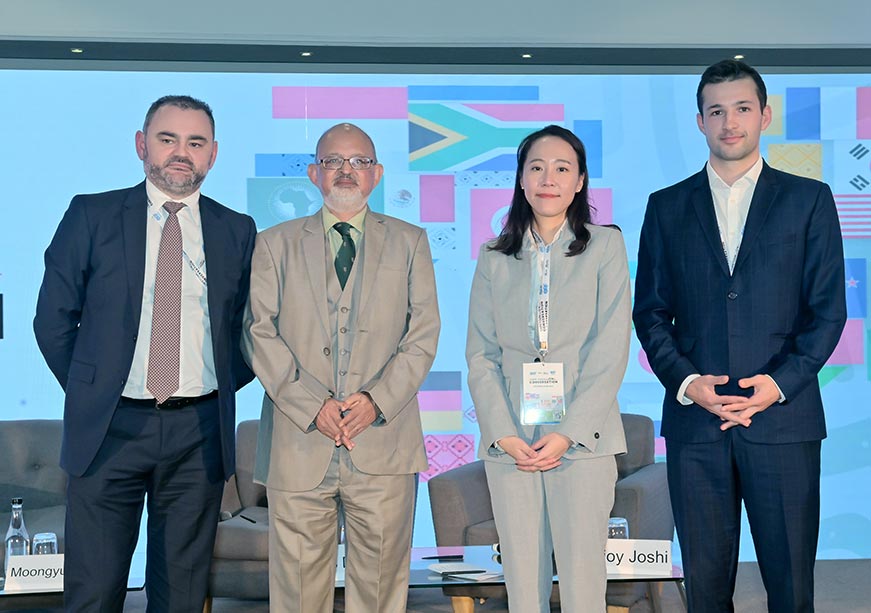-
CENTRES
Progammes & Centres
Location

Image Source: File Photo
In the face of rising energy demands and a growing need for sustainable development in the Global South, financing energy transition has become a critical challenge. With economies across the region striving to meet increasing energy needs while ensuring affordability, reliability, and sustainability, the role of financing mechanisms has never been more crucial. As these nations grapple with complex issues like economic shocks, rising energy costs, and the impacts of climate change, there is a pressing need for innovative financing solutions and international cooperation to ensure a smooth transition to sustainable energy sources.
In this context, the Sustainable Finance in the Indo-Pacific (SUFIP) Development Network (DN) convened a panel discussion titled "Burning Challenge: Financing Energy Transitions in the Global South" at the Cape Town Conversation 2024. The session focused on various financing modalities for the energy transition in the Global South, addressing the complexities of resource mobilisation and discussing opportunities for collaboration between the public and private sectors. The discussion aimed to bring attention to the financing strategies, innovative mechanisms, and role of international partnerships required to support the Global South's energy transition.
The session featured Denis Durrsi, Chief Executive Officer, White Roads Investment Company; Moongyung Lee, Policy Analyst, Organisation for Economic Co-operation and Development (OECD); and Alexander Panhofer, Green Finance Consultant, FINGREEN. The discussion was moderated by Sunjoy Joshi, Chairman of the Observer Research Foundation.
Sunjoy Joshi set the stage for the discussion by emphasising the urgent need for financing solutions to support the energy transition of the Global South. He underscored the importance of aligning resources, technologies, and policies to ensure that the energy transition is both sustainable and inclusive, addressing the unique needs and challenges faced by these economies.
Denis Durrsi opened the discussion by highlighting the magnitude of energy demands in the Global South, where rapid population growth and industrialisation are exacerbating the strain on existing energy infrastructure. He called for innovative financial models that combine private and public sector resources, as well as the development of strong governmental frameworks to incentivise investments in renewable energy. Durrsi also emphasised the need for international cooperation to pool resources and address the financial gap in energy infrastructure development.
Moongyung Lee provided a policy-focused perspective, discussing the various financing mechanisms that could support the energy transition in the Global South. She pointed to models like concessional loans, green bonds, and blended finance, which can be leveraged to fund energy projects in developing countries. Lee stressed the importance of governance structures that ensure transparency and the effective allocation of financial resources. She also noted the need for policy alignment that maximises the impact of financial flows and encourages long-term sustainable investments.
Alexander Panhofer focused on the role of the private sector in financing energy transitions, particularly through green finance. He highlighted the growing interest among institutional investors in financing sustainable energy projects but noted the hesitation of private investors due to perceived risks and uncertain returns. Panhofer argued for the introduction of risk-sharing instruments and guarantees from multilateral development banks (MDBs) to mitigate these concerns. He also suggested exploring performance-based financing models that link funding to the measurable success of energy projects.
The discussion underscored the critical role of public-private partnerships in financing energy transitions, with an emphasis on the need for strong governance and enabling policies to attract investments. Innovative financing mechanisms, including green bonds and blended finance, were identified as key tools to overcome financial barriers. International cooperation and the involvement of multilateral development banks were highlighted as essential for mitigating risks and ensuring sustainable energy infrastructure development. The session also reinforced the importance of aligning financial resources with long-term sustainability goals, providing energy access remains affordable and reliable for the Global South.
The session concluded with a call to action for continued collaboration and innovation in financing the energy transitions of the Global South. The speakers were optimistic about the potential of public-private partnerships, innovative financial tools, and international cooperation to address the challenges of rising energy demand and climate change. By aligning efforts and pooling resources, the Global South can pave the way for an inclusive, affordable, and resilient sustainable energy future.
This event report is written by Sharon Sarah Thawaney, Executive Assistant to the Director (Kolkata), Observer Research Foundation
The views expressed above belong to the author(s). ORF research and analyses now available on Telegram! Click here to access our curated content — blogs, longforms and interviews.